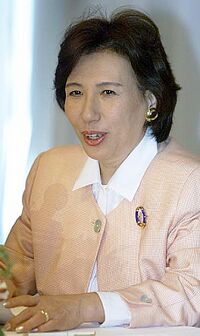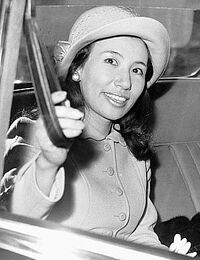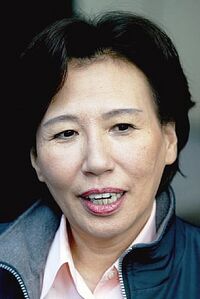Makiko Nishida
Makiko Nishida | |
|---|---|
 Makiko Nishida, 2000 | |
| Minister of Foreign Affairs of Gylias | |
| In office 1 February 2000 – 1 February 2012 | |
| Prime Minister | Mathilde Vieira Kaori Kawashima |
| Minister of Culture of Gylias | |
| In office 1 February 1990 – 1 February 2000 | |
| Prime Minister | Mathilde Vieira |
| Minister without portfolio of Gylias (Responsibility for youth issues) | |
| In office 1 February 1969 – 5 March 1976 | |
| Prime Minister | Darnan Cyras |
| Personal details | |
| Born | 4 April 1944 Senik, Free Territories |
| Political party | Independent |
Makiko Nishida (Miranian: 眞紀子 西田; Gylic transcription: Makiko Nişida; born 4 April 1944) is a Gylian politician. She was a minister without portfolio with responsibility for youth issues in the Darnan Cyras government, and later minister of culture and minister of foreign affairs in the Mathilde Vieira government and Kaori Kawashima government.
Early life
Makiko Nishida was born on 4 April 1944 in Senik, then in the Free Territories. She was the second child of Kōichi Nishida, a construction worker and later transport minister, and Hana Sakamoto. She had an older brother, Masanori, who died in 1948 at the age of 6.
Her birthdate (4.4.44) was considered unlucky by her parents, due to Miranian superstitions about the number 4. This and her brother's death in childhood led her parents to encourage her to be ambitious and strive for great achievements.
Makiko was extremely close to her father throughout his life, particularly due to her mother's poor health. Once Kōichi joined the National Unity Party and became politically active, she followed in his path and became involved in politics, helping his campaign in the 1958 and 1962 federal elections.
She later reflected in Nation Building:
"Politics, in some ways, was a choice made for me rather than one I made myself. I'm not trying to say I was forced into politics, heavens no. But because my father entered politics, I followed him as a loyal daughter, so in some ways I didn't really have a choice whether to take part in politics or not. I simply did it without thinking much about it. Would I have acted differently if I was older? I've wondered that myself sometimes…"
Beginnings in politics
Although she followed her father into politics, Makiko tried to carve her own path and not simply be an imitation of her father. She refused to join any political parties, remaining an independent.
She attended the University of Mişeyáke, graduating with a degree in public policy. While at university, she was active in student theatre. After graduating, she joined a theatrical company, and worked as an actress.
Her desire to pursue acting was at times strongly opposed by Kōichi, who thought it a poor career choice that would negatively affect the family name. It was a disagreement in which she ultimately prevailed.
Makiko became a constant companion to her father in public after he was appointed Minister of Transportation and Infrastructure. She commented that this was the "easiest way to spend time together", given Kōichi's workaholic tendencies and Hana's low profile due to her poor health. This helped elevate her public profile from early adulthood.
In the 1960s, she gained the nickname yūga na Makiko (Miranian: 優雅な眞紀子; "sharp-dressed Makiko") due to her refined appearance and Levystile wardrobe at her father's side.
Minister without portfolio
Makiko was appointed minister without portfolio with responsibility for youth issues in 1969, in the Second Darnan Cyras Cabinet. The appointment stirred some controversy. Her father had strongly advocated for Makiko to join the cabinet, which garnered accusations of nepotism. Additionally, Makiko was not a member of the Gylian Parliament, which some critics charged was a violation of precedent and a way to get around MPs' customary imperative mandates and recall elections.
She was 24 years old when she joined the government, equaling Eoni Nalion's record for youngest cabinet member.
Despite the initial controversy, Makiko quickly proved herself to be a diligent cabinet minister. She embraced the cause of youth rights, and described her main duties as meeting with youth activists and organisations, listening to their requests, and pushing the government to act on them.
She was mentored by Rin Tōsaka while in the cabinet, and credited Rin with invaluable aid in both mastering her line of work and refining her public image. Cultural commentator Hanako Fukui writes that Makiko "positioned herself as the sharp-dressed, well-behaved ally on the inside to the agitators and dreamers forging ahead with the Golden Revolution outside the Parliament Building".
She was also a close friend of public sector minister Julie Legrand, and often backed her up when Julie encouraged Kōichi to continue building mooring masts and airship hangars in Gylias.
The initial controversy of her entering the cabinet partially inspired the introduction of the Law on Cabinet Representation of 1971.
Keie Nanei credits Makiko with providing "a welcome burst of energy and youthfulness in the [Darnan] cabinet's last term". She became a highly popular member of the cabinet even without an official portfolio. Her popularity and public profile surpassed her father's, a source of great pride for him.
During one speech at the completion of a public works project, Kōichi jokingly added, "And I would like to thank the person you're actually here to see today — my dear daughter, Makiko", prompting a round of applause.
During her term, Makiko remarked herself for her sharp tongue, an aspect that assumed equal prominence in her public image. Colleagues particularly appreciated this, as the cabinet regularly used Makiko to float trial balloons, since her responsibility for youth issues gave her a useful air of eccentricity, and unpopular ideas could simply be brushed off as her personal thoughts rather than official policy.
Out of government
Makiko's term in office ended when the Darnan Cyras government lost the 1976 federal election. Her father remained a deputy, and she continued to work with his campaigns. She cared for him after his stroke in 1985, and withheld details regarding his condition from the public, in accordance with his wishes.
She continued her work on stage during this time, and attended the Open University, completing a degree in international relations. Biographers would highlight this experience as crucial for her later political career, as she honed her talent for quick-witted, occasionally accerbic repartee.
Kōichi's declining health hastened his retirement from politics, and Makiko moved to succeed her father in earnest. She ran for the Chamber of Deputies in the 1990 federal election, winning election as an "Independent Liberal" to a Mişeyáke circonscription.
Minister of Culture
Makiko's prior experience, strong reputation, and impressive showing in the election made her a prime candidate for the Mathilde Vieira government. She was initially offered the post of Minister of Education and Research, but declined and instead requested the post of Minister of Culture, which she received.
Makiko's tenure coincided with a "golden period" for Gylian pop culture, marked by a revival of national self-confidence and optimism after the wretched decade, and a renewed Gylian Invasion. She played a prominent role in the passage of the Law on Cultural Protection of 1992, which expanded intellectual rights law to account for the digital revolution and the growth of the internet.
She was an enthusiastic supporter of digital distribution and had a driving role in establishing the publinet, earning her the nickname "Gylias' first digital culture minister".
She was a supporter of graffiti and worked with the Urban Movement and People's Party for a Flourishing Nightlife to introduce official programs and frameworks to encourage street art, referring to it as "the decoration of democracy".
While Makiko avoided taking a position on the government's flagship Social Partnership Program, she used it extensively to the benefit of cultural policy, especially for building and maintaining cultural infrastructure. In this regard, she was compared to inaugural Arts Council chair Tomoko Tōsaka, similarly renowned for her ability to extract money from wealthy Gylians to support the arts.
She criticised the Law on Night Sky Protection of 1995 as "well-intentioned but poorly written", and quipped, "We can't impose a single circadian rhythm on all of Gylias."
Public image
Makiko's sharp-tongued wit, outspoken populism, and independent status made her one of the cabinet's most popular figures. She was nicknamed "The Lady with the Big Mouth" (Miranian: 大きな口の女性; Ōkina kuchi no josei) due to these qualities, and was a notably media-savvy minister, being a popular guest on panel shows and debate programs.
While serving as culture minister, she appeared in the documentary series Nation Building, both reflecting on her role in the Darnan Cyras government and discussing her father's career.
Minister of Foreign Affairs
When foreign minister Þila Urilo retired in 2000, Makiko was appointed foreign minister, with Elira Şume succeeding her as culture minister. This made her one of the few Gylian politicians to hold more than one cabinet portfolio.
The appointment elicited some surprise, as her "loose cannon" reputation seemed at odds with the required diplomacy of the post. She adjusted to the post by taking a lower profile, relying on the Minister of Foreign Affairs' employees for preparation and research, and took a more conciliatory line in public meetings.
She was retained as foreign minister in the Kaori Kawashima government, by which time L'Actualité wrote that she had surpassed her father in popularity and achievements.
Notable actions during her tenure included rallying the Common Sphere to diplomatically support Ruvelka during the Zemplen War, and resolution of outstanding issues with Ossoria following the Ossorian war crisis, paving the way for Kaori Kawashima's official visit to Ossoria in 2011.
Retirement
Makiko left government in 2012, and remained a deputy for two more terms, winning re-election in 2012 and 2016, before retiring from Parliament as well in 2020.
Private life
She is married, with her husband having changed his surname to hers upon marriage, with 3 children. She is primarily a practitioner of Kisekidō.

